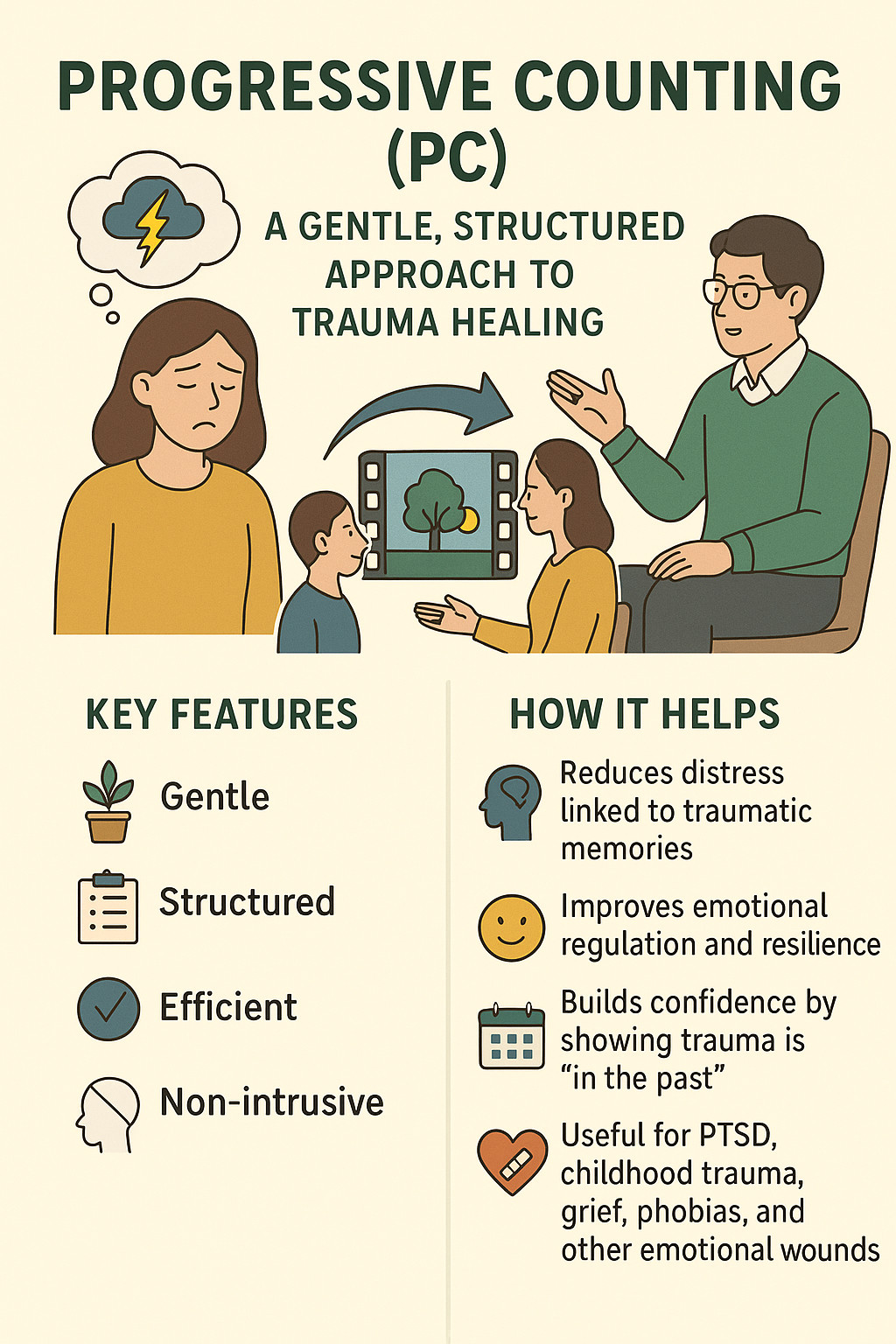Progressive Counting (PC) Singapore
Home > Psychotherapies > Progressive Counting (PC)

Progressive Counting: A Step-by-Step Method to Calm Past Trauma
Progressive Counting (PC) is a trauma therapy developed by Dr. Ricky Greenwald to help people safely process painful or overwhelming memories. At Insightful Counselling in Singapore, we use PC to reduce the emotional weight of past experiences so they no longer control your present. Through a gradual and structured process, Progressive Counting allows you to heal from trauma, regain a sense of calm, and move forward with greater resilience.
Progressive Counting (PC) In Singapore
PC is an exposure-based therapy designed to help people process and heal from traumatic or upsetting memories.
Instead of talking in detail about the trauma, the client visualizes a “movie” of the memory in their mind.
The therapist guides the person to replay this memory movie several times while slowly increasing the count (e.g., from 10 to 20 to 30, etc.) as they imagine the experience.
Over time, this progressive exposure helps reduce the emotional intensity of the memory.

When we go through trauma, the memory often stays “stuck” — replaying as images, emotions, body sensations, or negative beliefs about ourselves. PC helps “unstick” those memories by guiding you to revisit them in a safe and structured way.
- The memory is brought to mind briefly, while you count along with me (out loud or silently).
- We begin with a short count of 10, then gradually increase to 20, 30, and higher — this is the “progressive” part.
- With each round, something may shift. The memory itself may change — new details might appear, the images may soften, or the emotional intensity may lessen. Thoughts, feelings, body sensations, and even long-held beliefs about yourself can begin to shift too.
- Over time, what once triggered strong emotional or physical reactions becomes calmer, lighter, and more distant.
- Gentle pace – The work is broken into short, repeatable “sets,” so you’re not overwhelmed.
- Structured process – The progressive counts keep sessions focused and safe.
- Whole-person healing – PC works with not just memories, but also images, feelings, body sensations, and beliefs connected to them.
- Lasting change – Once the memory loses its emotional intensity, it usually stays that way.
Progressive Counting has been used successfully with:
- Childhood adversity (neglect, parental conflict, bullying)
- Loss and grief
- Accidents and medical trauma
- Abuse and interpersonal trauma
- Anxiety, fear, or stress linked to past experiences
I see myself as a personal wellness trainer for trauma. Just as a trainer helps you build physical strength step by step, PC gives us a safe, structured way to build your inner strength — so that old memories no longer control how you feel, think, or live today.
Book Your Therapy Session Today for Progressive Counting Singapore
Frequently Asked Questions
Progressive Counting (PC) is a structured trauma therapy technique that helps people heal from painful memories by replaying them in a safe, guided way. It reduces the emotional charge of traumatic experiences without needing to share every detail.
In PC therapy, clients visualize their memory as a short “movie.” The therapist guides them through replaying this movie multiple times while slowly increasing the count. This gradual exposure helps the brain process the trauma and store it as something in the past, not a current threat.
Yes, Progressive Counting has been shown to be effective for PTSD, childhood trauma, grief, and phobias. Research suggests it can bring lasting relief in fewer sessions compared to some traditional talk therapies.
Gentle and non-intrusive approach
Structured process that feels safe
Efficient – often fewer sessions are needed
Reduces distress linked to traumatic memories
Improves emotional regulation and resilience
Both PC and EMDR are structured trauma therapies that reduce distress linked to painful memories. The main difference is that EMDR uses eye movements or bilateral stimulation, while PC uses counting and guided imagery. Some clients find PC gentler and easier to follow.
Progressive Counting is helpful for adults, teens, and children dealing with:
Post-Traumatic Stress Disorder (PTSD)
Childhood trauma and neglect
Grief and complicated loss
Anxiety and phobias
Other distressing life events
Yes, PC is considered gentle and less overwhelming compared to traditional exposure therapies. Because it is structured and paced, clients remain in control and can process memories without retraumatization.
Testimonials
Counselling sessions with Reena have been of great value to me. Past few years, I have been suffering from a generalised anxiety disorder. The Brainspotting technique used by her in the sessions was magical; it helped me unfold my deepest thoughts. Her gentle enquiry to further the exploration was both soothing and healing. Every session had outstanding results. Thank you so much!!

